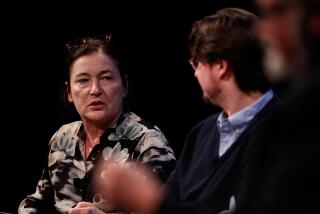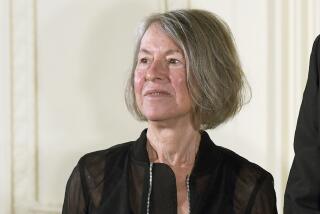An Elegant Portrait of a Lady Who Wanted So Much More
- Share via
“Violet Longcope had, from the earliest signs of her daughter’s incipient beauty, drilled into Clarabel’s lovely head the warning that a single unwary submission of the heart to the wrong male charm could throw a girl perhaps irretrievably off the smooth tracks of the best laid life plan,” begins Louis Auchincloss’ 41st book of fiction, “Her Infinite Variety.” And, indeed, the whole novel is contained in that single elegant sentence. To Clarabel, or Clara, as she is known as an adult, life is a game, to be won at any cost. She does win, at much cost to others. At what cost to herself, the reader can only imagine, for she is exultant at the book’s end and thanks her mother heartily for her chilly advice.
The setting of “Her Infinite Variety,” in typical Auchincloss fashion, includes Yale, the estates on the North Shore of Long Island, the Upper East Side of Manhattan. Clara grew up before World War II, in a world that seemed to her parents and their friends to be perfectly secure and if not perfectly ordered, at least manageably so. If anything in that smooth life of the prewar upper class went wrong, it could be set to rights. Auchincloss has been accused by some critics of writing unnatural dialogue. Indeed, in the mouths of most people it would be unnatural. But it is just the sort of language that people in that set did use (and that those who are left still do).
Here is Clara, as a Vassar student, fighting against her mother’s determined (and successful) effort to get her to stop seeing the young man she is infatuated with. As the argument proceeds, Violet, her mother, works on a crossword puzzle:
“ ‘Mother, you must talk to me!’
“Violet filled in a word before looking up. ‘You’re at liberty to wreck your own life, my dear. But don’t ask me to be your auxiliary. I’ll have nothing to do with it!’
“ ‘But if I beg you to discuss it with me!’
“Violet put down the paper. ‘In that case, of course, I will. I’ve been waiting for the moment when I thought you might be ready to listen. . . .’ ”
Auchincloss gets exactly right not only the talk but also the social nuances of that world, in which he has lived for more than 80 years. It is not enough to be at Yale, for example; you have to be in the right college at Yale (some of those living quarters are more chic than others, of course). That Clara’s father was master of one of the lesser Yale colleges embittered Clara’s mother and figured in her advice to Clara. Clara took that advice and threw over the boy she was crazy about for Trevor Hoyt, a young man from a well-to-do New York family prominent “in the world of private schools, the subscription dances, the opera, the art museums, the benefit balls.”
So Clara became, in the 1930s, Mrs. Trevor Hoyt. She and her husband had a tiny duplex on Park Avenue and a “tastefully redecorated gatehouse” on his parents’ Georgian estate on the North Shore of Long Island. But all that was not enough, not nearly enough. When Clara thought back to her school days at St. Timothy’s, she realized she “wanted more things than her friends did. She wanted indeed everything that the world might not give her.”
What she wanted was power. But in the 1930s, ‘40s and ‘50s, America had hardly begun to admit women to those places where they could wield power. So Clara achieved power the only way she knew, through men. And in the end, through husbands and lovers, she accumulates both lots of money and no inconsiderable power in the New York publishing and philanthropic worlds. She has, in fact, the last laugh. Or does she? Auchincloss leaves you to wonder whether Clara, in fact, ever had that human necessity, a heart. That you do wonder points to a flaw in “Her Infinite Variety.” Smoothly written, neatly plotted, it is in the end a bit too mechanical.
More to Read
Sign up for our Book Club newsletter
Get the latest news, events and more from the Los Angeles Times Book Club, and help us get L.A. reading and talking.
You may occasionally receive promotional content from the Los Angeles Times.









